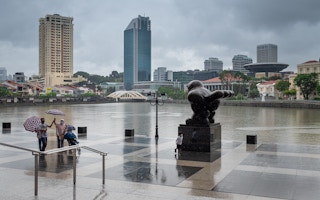Singapore’s sustainability and environment ministry (MSE) says it is premature to draw conclusions on who pays and who gets money from a “loss and damage” fund to help vulnerable countries recover from climate disasters, given that details have yet to be discussed among countries.
To continue reading, subscribe to Eco‑Business.
There's something for everyone. We offer a range of subscription plans.
- Access our stories and receive our Insights Weekly newsletter with the free EB Member plan.
- Unlock unlimited access to our content and archive with EB Circle.
- Publish your content with EB Premium.
The ministry was responding to a statement put out by local climate group Singapore Youth for Climate Action (SYCA) in mid-March, asking the government to clarify on what sustainability and environment minister Grace Fu said in Parliament last month about Singapore standing as “potential claimant” for loss and damage funding. SYCA’s statement had also said it hopes Singapore would not be a claimant to the fund.
Fu had been replying to an opposition lawmaker on whether Singapore would be contributing to the fund or not. She had noted that countries long industrialised, including those like Germany and the United Kingdom, should help vulnerable countries with climate risks. Singapore is already committing money and resources on its own adaptation efforts, and stands as potential claimant from the loss and damage fund because it is classified as a developing country, she said, adding that the city-state would be engaging with a committee set up at the United Nations on the design of the fund.
In a public statement published on its social media platforms, SYCA said it was “shocked” to hear the minister say that Singapore is a potential claimant for loss and damage funding, given that there have been calls for wealthy states classified as developing countries – a group Singapore is generally considered to be part of along with others such as South Korea and Qatar – to contribute to the fund.
It noted Singapore is relatively shielded from natural disasters compared to other countries in the region – citing examples of regular cyclones in Bangladesh, a 2013 typhoon in the Philippines that caused nearly US$3 billion in damages, and a record flood in Pakistan last year that is expected to set the country back US$46 billion.
“We understand that Singapore is acting in its national interest, but surely there must be limits to such self-interested behaviour as well. Taking these funds reflect our lack of concern for our neighbours, and breaks the bilateral trust with those whom Singapore claims to be an ally to,” its statement said. SYCA member Terese Teoh told Eco-Business that the group believes Singapore should contribute to the fund instead.
In response to SYCA’s statement, a MSE spokesperson said Fu had “stated factually that Singapore is classified as a developing country”. The spokesperson did not directly indicate if Singapore would look to contribute to or claim from the fund, stating that it would be premature to draw conclusions on who the loss and damage donors and recipients are. MSE noted that the landmark Paris Agreement signed by countries globally in 2015 to keep global warming well below 2°C reaffirms the obligation for developed countries to mobilise climate finance.
SYCA’s statement does not give an accurate account of Fu’s comments, the spokesperson said.
The spokesperson also highlighted a social media post Fu had made about Singapore’s efforts to support fellow developing countries, such as via providing technical assistance, and funding through a Southeast Asia risk financing initiative.
The spokesperson added that Singapore intends to engage constructively with the loss and damage committee that is due to meet next Monday (27 March). The committee comprises both developed and developing countries, and will need to write the rules for the fund before the COP28 climate summit at the end of the year. Singapore is not a part of the committee.
The agreement to set up a loss and damage fund has been regarded as a key victory for developing countries at last year’s COP27 summit, though much of the details of the fund, including who pays and who receives, remain unclear.










